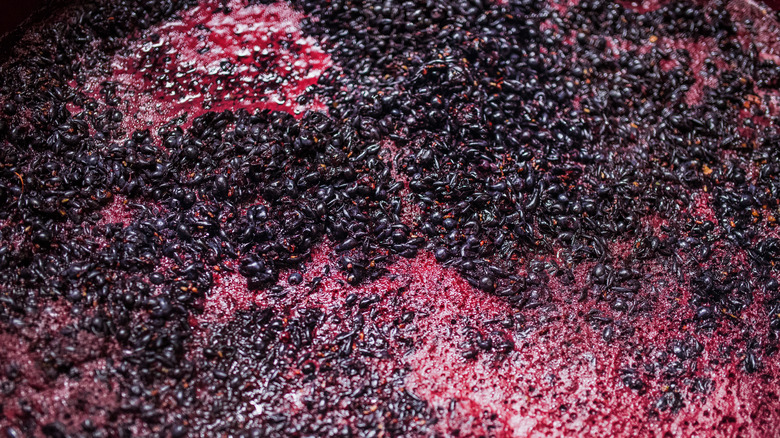Is There A Nutritional Difference Between Red Wine And White?
Of all the alcoholic beverage options on the menu, wine is probably the only choice we may associate with anything other than the following morning's gift of throbbing temples. Opting for a glass of vino does seem to mitigate the repercussions of imbibing, most likely due to a popular headline or two over the years informing us there may be some health benefits to the sauce, per Mayo Clinic.
Just because there are no nutrition labels on wine bottles doesn't mean they are void of nutrients. Grapes are a fruit, one of nature's desserts, and pretty packed with beneficial goodies (via Medical News Today).
It would be safe to assume the nutritional value of various types of grapes translates to a juice made from them then — and it does. But does the red, green, or purple coat that a grape wears affect the levels of its nutrients underneath?
While most wine is no longer made by rolling up one's pant legs and smashing away with bare feet (thankfully!), the method by which white versus red wine is made contributes to the nutritional value of the libation.
Skin in the game
Minus the feet, the process of making major types of red wine hasn't changed much in over 6,000 years. Darker grape varieties are crushed and fermented and then separated from the skins and seeds. Other than some yeast and possibly a preservative or two, those are the basic ingredients in wine. The skin contact during this process contributes to the color (via Wine Enthusiast).
In white winemaking, the color of the grape is not a factor. Per Wine Enthusiast, the skin is not involved in the fermentation process, which lends to the lack of color in white wine.
The difference in calories, carbohydrates, and sugar between red and white wine is negligible (via Deluxe Wine & Spirits). However, the grape skin and seeds involved in the fermentation process of red wine give it a slight edge in some nutritional value over white varieties. This process gives the red stuff healthy compounds such as antioxidants, like resveratrol and flavonoids, as well as vitamins and minerals like iron, magnesium, and niacin.
Another tidbit to keep in mind: Many wines — of both color varieties — are not vegan, as egg whites and other animal products are often used in their creation.

